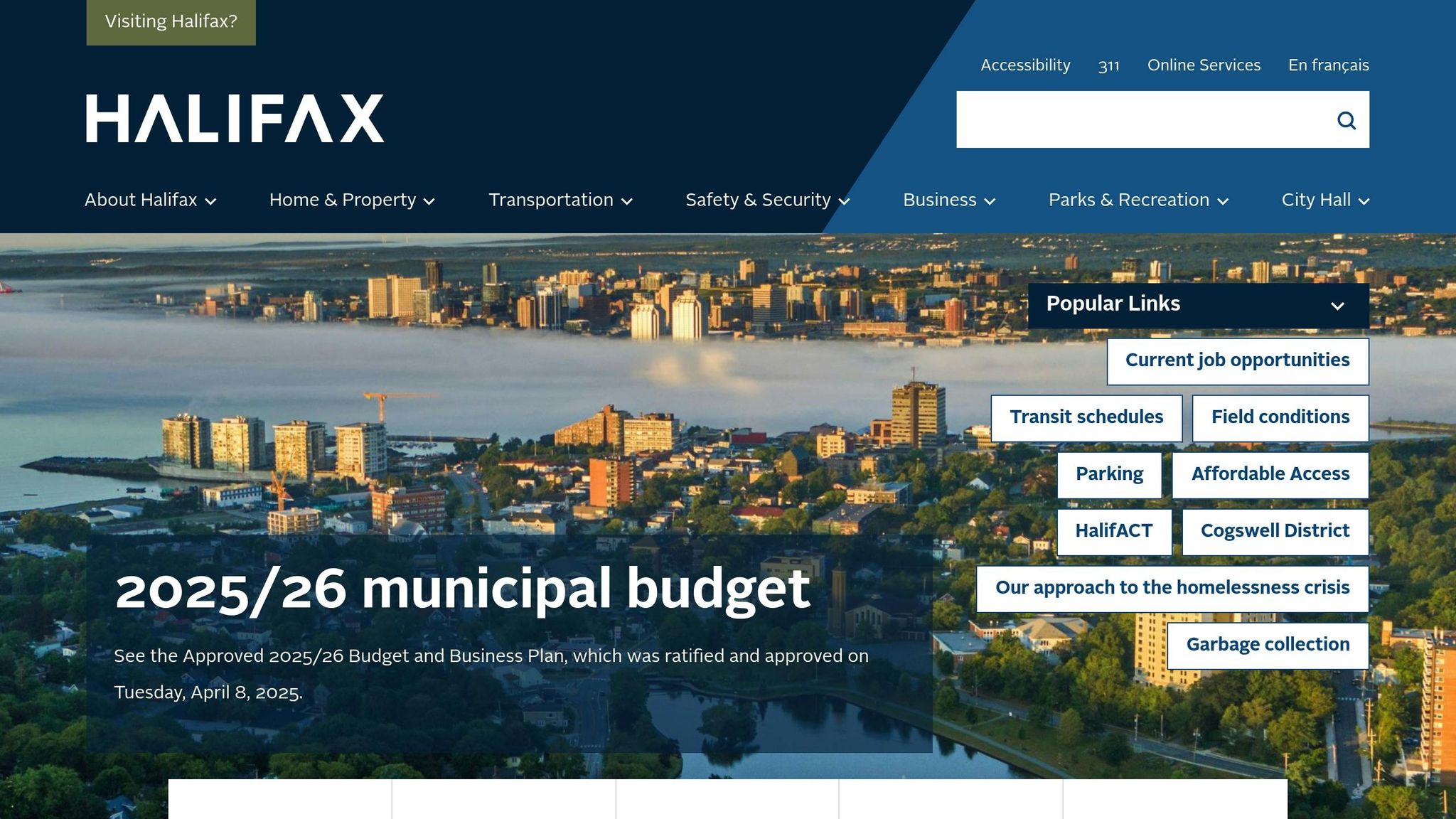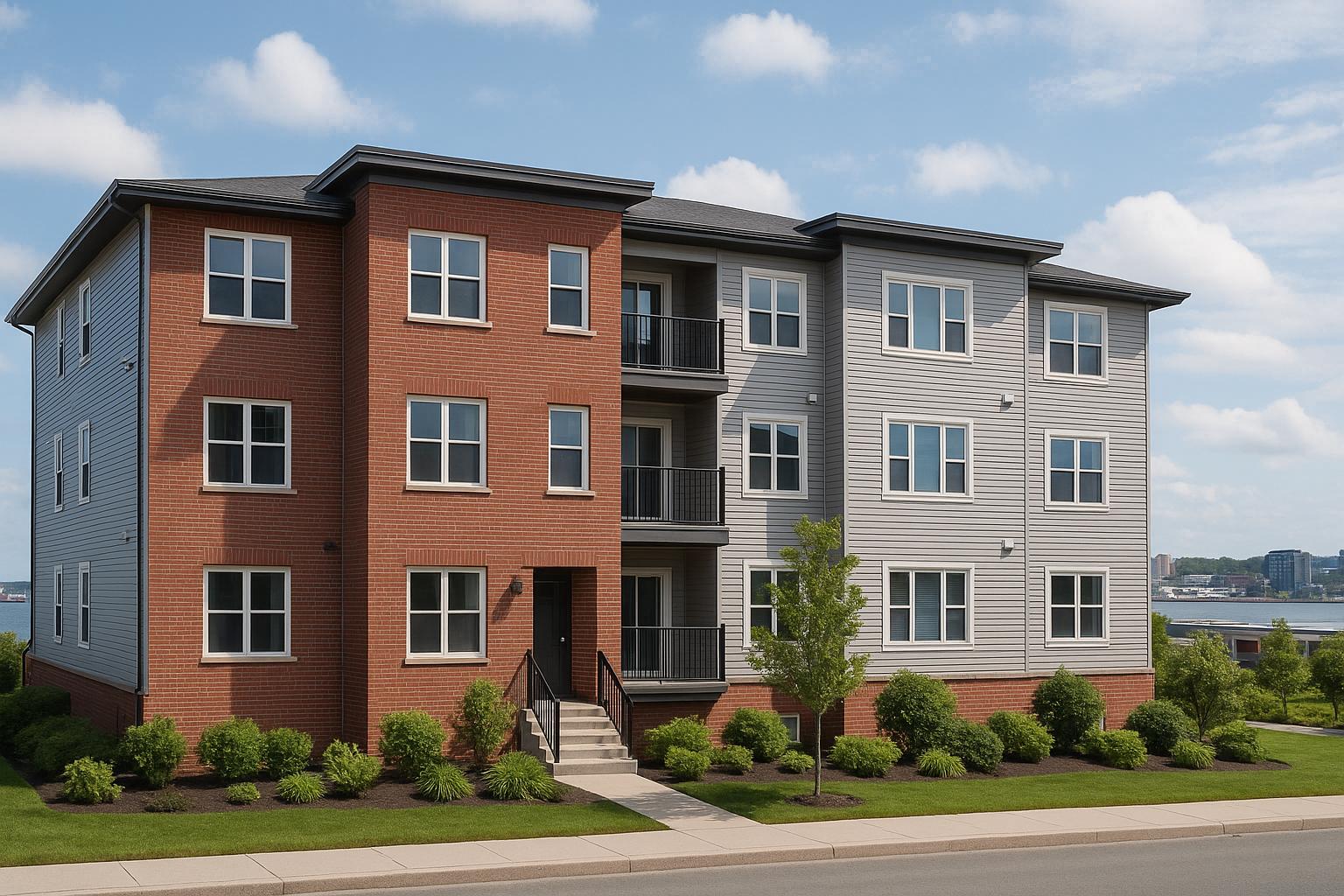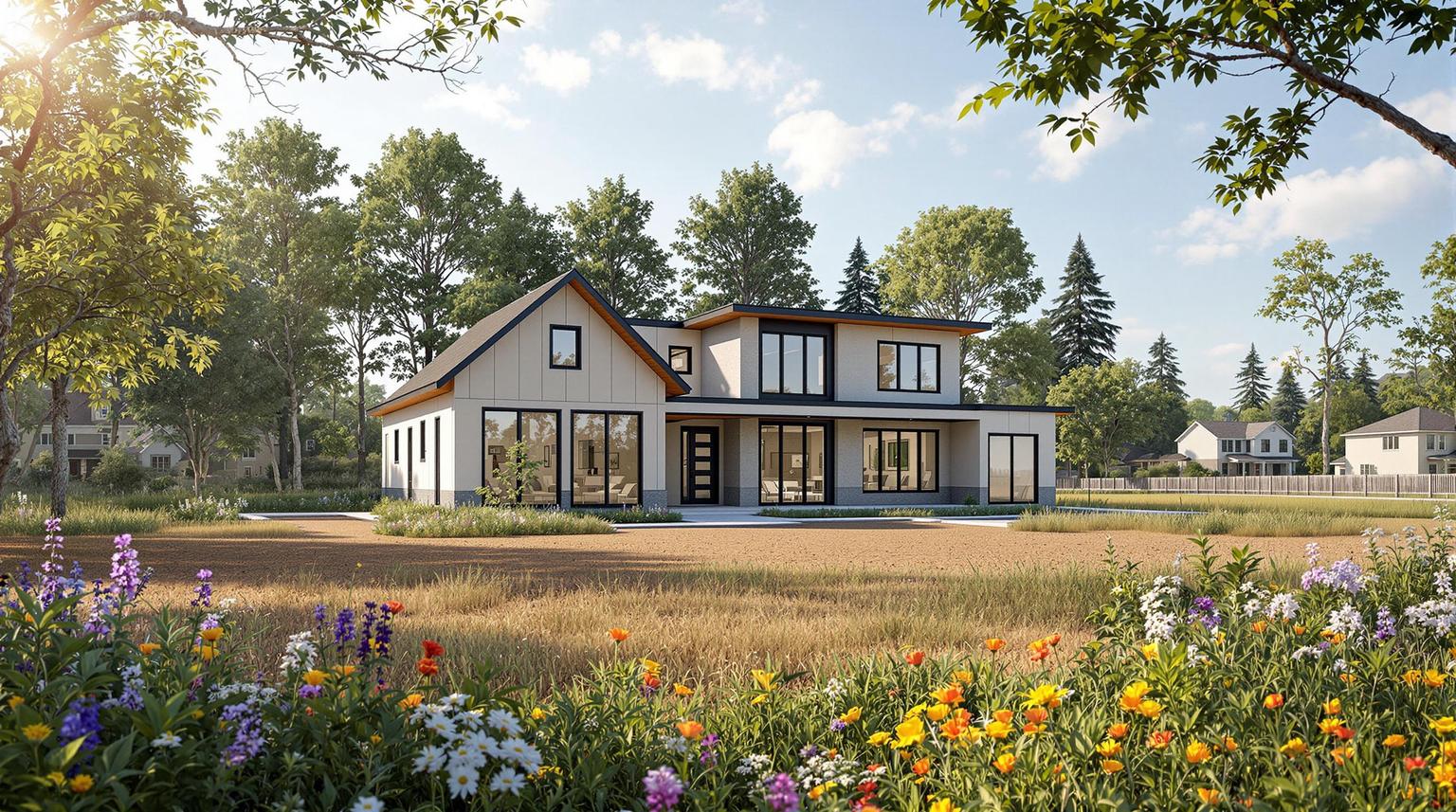Building a custom home in Nova Scotia takes 8–12 months on average. Factors like weather, permit approvals, and labour availability can affect this timeline. Winter months (December–March) often slow progress due to cold temperatures and snow, while April–October generally allows for faster work. Here's a quick breakdown:
- Planning, Permits, and Financing: 2–8 weeks
- Construction Phases:
- Site preparation
- Foundation work
- Framing
- Exterior envelope (roofing, siding, windows)
- Mechanical systems (plumbing, electrical, HVAC)
- Interior finishing (drywall, flooring, cabinetry)
- Final touches (painting, fixtures, appliances)
To stay on schedule:
- Finalize designs early.
- Choose a builder with fixed-price contracts and clear timelines.
- Plan for potential winter delays.
- Communicate regularly with your builder.
Tip: Budget 2–12 weeks for permit approvals, as processing times vary by municipality.
Main Construction Phases
Planning, Permits, and Financing
This phase, lasting about 2 to 8 weeks, includes securing municipal permits, finalizing development agreements, arranging construction financing, and completing design reviews. Delays in permit approvals can push back the entire project timeline [1]. To avoid setbacks, ensure you submit complete construction drawings, site plans, and engineering reports before applying.
Building Timeline from Start to Finish
After permits are approved, construction moves through these key stages:
- Site preparation: Clearing and grading the land.
- Foundation work: Pouring the foundation and ensuring structural stability.
- Framing: Building the skeleton of the home.
- Exterior envelope: Adding roofing, windows, and siding for weatherproofing.
- Mechanical systems: Installing plumbing, electrical wiring, and HVAC systems.
- Interior finishing: Completing drywall, flooring, and cabinetry.
- Final touches: Painting, installing fixtures, and setting up appliances.
In Nova Scotia, most custom homes are completed within 8 to 12 months after construction begins. Up next, we’ll break down a month-by-month schedule to show how progress typically unfolds.
[1] Typical timelines for permits, design approvals, and financing in Nova Scotia.
(The Lack of) Building Permits in Halifax, Nova Scotia ...

Average Build Time in Nova Scotia
In Nova Scotia, building a home usually takes between 8 and 12 months. This timeline can vary based on factors like weather conditions, availability of trades and materials, and how quickly permits are processed. Helio's pre-designed plans help streamline the process by using standardized layouts and working with reliable trade partners.
For small multi-unit projects (up to eight units), the timeline often stretches by a few extra months due to the added complexity of coordination.
Seasonal Impact on Build Time
Winter months (December to March) tend to slow construction because of cold temperatures, snow, and shorter daylight hours. In contrast, April to October offers longer days and fewer weather-related interruptions. Helio addresses these challenges with in-house trades, detailed scheduling, and real-time tracking to stay on top of any weather or site issues.
sbb-itb-16b8a48
Nova Scotia Building Challenges
Building a house in Nova Scotia comes with its own set of hurdles that can impact construction timelines. Knowing these challenges in advance helps you plan better and set realistic expectations.
Winter Construction Delays
Nova Scotia's winters can put a pause on construction activities, especially from December to March:
- Frost in the ground can stall excavation and foundation work.
- Low temperatures make curing concrete more difficult.
To keep things moving, Helio uses cold-weather protocols and adjusts schedules in real time.
Worker and Supply Availability
Labour shortages and material delays can also slow things down:
- Limited local labour, rising material costs, and long wait times for specialty items like windows and doors.
Helio tackles these issues by relying on in-house engineers, ordering materials early, and coordinating schedules to ensure trades and supplies are ready when needed. This proactive approach keeps projects on track and timelines more predictable.
Local Permit Processing Times
Permit approvals in Nova Scotia vary by municipality and can depend on factors like:
- The completeness of your application.
- Zoning reviews and compliance checks.
- Environmental and heritage assessments.
Helio streamlines the process by submitting thorough applications and working directly with municipal officials to expedite reviews.
Managing Construction Timelines
Delays are common in construction, but you can take steps to keep your project on track.
How to Choose the Right Builder
Winter slowdowns and permit delays can derail your timeline. Selecting the right builder can make all the difference. Look for builders who:
- Offer fixed-price contracts, so you avoid unexpected costs.
- Provide detailed project timelines upfront, giving you a clear roadmap.
Steps to Plan Ahead
Proper planning before construction begins is key to avoiding setbacks. Here's how to prepare:
- Finalize your design early: Lock in all design decisions before construction starts to avoid costly mid-project changes.
- Communicate regularly: Set up consistent check-ins with your builder, using instant messaging or daily updates to stay informed.
- Stick to the schedule: Follow the agreed-upon timeline to meet critical milestones.
Conclusion
Building a custom home in Nova Scotia usually takes 8–12 months. Factors like weather, permit approvals, and labour availability can impact the timeline. Working with a builder who provides fixed-price contracts, clear schedules, and real-time updates can help avoid unnecessary delays.
Here are five tips to keep your project on track:
- Finalize all design decisions before construction begins.
- Choose a builder with fixed-price contracts and detailed timelines.
- Account for potential winter-related challenges.
- Stay in regular communication with your construction team.
- Budget 2–12 weeks for permit approvals.
A builder with a structured process, real-time updates, and instant messaging can make a big difference in keeping everything on schedule.
FAQs
What are the common factors that can delay building a house in Nova Scotia?
Several factors can contribute to delays when building a home in Nova Scotia. One of the most significant is the harsh winter weather, which can slow down or temporarily halt construction activities. Additionally, contractor availability can impact timelines, especially during peak building seasons when demand is high.
Recent challenges, such as labour and material shortages, have also caused delays in some cases. Planning ahead and working with an experienced builder who has strong project management skills can help mitigate these issues and keep your project on track.
How can I communicate effectively with my builder to keep my home construction on schedule?
Clear and consistent communication with your builder is key to keeping your project on track. Start by setting realistic expectations and discussing a detailed timeline that outlines each phase of the build. Make sure to understand the key milestones, such as permits, foundation work, framing, and finishing stages.
Regular check-ins are essential. Schedule weekly or bi-weekly updates to review progress, address any concerns, and discuss potential delays. Be proactive by asking questions and clarifying details if something isn’t clear. Sharing your priorities and being open to solutions can also help resolve issues quickly.
Finally, choose a builder with a strong track record in project management. This ensures they can handle unforeseen challenges, such as weather-related delays during Nova Scotia’s harsh winters or material shortages, while keeping the project moving forward efficiently.
How can I prepare my design and financing before starting construction on my home?
Before construction begins, it’s important to have a clear plan for both your design and financing to avoid delays and unexpected costs. Start by working with a professional designer or architect to create detailed plans that align with your vision, budget, and the local building regulations in Nova Scotia. Ensure these plans are finalized before applying for permits.
For financing, speak with your bank or lender early to secure pre-approval for a construction loan or mortgage. Be sure to account for additional costs like permits, inspections, and potential delays. Having a contingency fund (typically 10-15% of your total budget) can help you stay on track if unexpected expenses arise. Planning ahead ensures a smoother process from start to finish.



